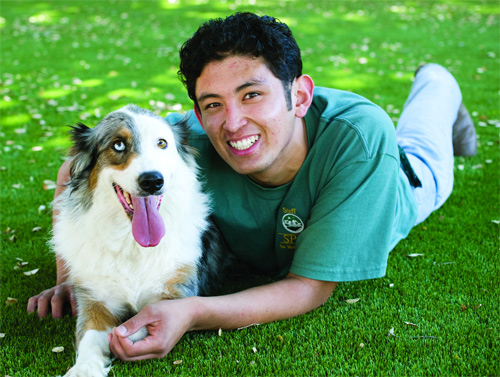After getting into some trouble two years ago, 18-year-old Luis Macias of Soledad landed at the Monterey County Probation Department Youth Center in Salinas. The residential facility houses juvenile males who have been arrested for various crimes, and administers rehabilitation and educational programs that prepare them to re-enter the community. Near the end of his stay, Macias signed up for Take the Lead, a program that pairs at-risk youth with untrained shelter dogs.
Participants learn to care for and train dogs. In the process, they often start viewing their own lives a little differently. “We were helping the dogs and they were helping us. It’s so powerful,” says Macias.”It’s very hard to make it on your own–a dog, a cat, a human being, whatever, we all need something stable, something that keeps us together through the toughest of times.”
“Quite a few of the incarcerated kids feel a connection with the dogs who, in their minds, are also incarcerated,” says Amanda Mouisset, the Take the Lead coordinator and SPCA for Monterey County pet behavior specialist. “But they’re also seeing this animal that deserves a second chance—we talk a lot about the dogs getting a second chance—so they see a lot of parallels.”
About 30 Youth Center teens have completed Take the Lead, which launched two years ago at Washington Middle School in Salinas and has since expanded to serve youngsters in Monterey County’s foster care system, as well.
Each participant spends five weeks training his or her dog to follow basic commands; at the end of the program, each student writes a letter that tells potential pet owners why they should adopt that particular dog. In addition to teaching kids about second chances, Take the Lead educates them on empathy, patience, compassion and cooperation.
Participants learn what it’s like to take responsibility for a living creature, which translates to lessons on caring for others and preventing animal cruelty. In some cases, working side-by-side to train dogs helps participants break down barriers associated with violence.
“We have members of various gangs here, and on the streets they wouldn’t be talking to each other. But in here, they intermingle,” says Alex Carrillo, Youth Center events coordinator. “We’re opening communication that would never have been attempted on the streets or even from block-to-block, so that’s a big deal.”
Gary Tiscornia, SPCA for Monterey County executive director, hopes to continue expanding Take the Lead as funding becomes available. He’s also been talking with other counties looking to start starting similar programs of their own. The concept is “a win-win,” he says, because high energy, hard-to-place dogs receive the training they need to get adopted, and students become more responsible community members.
“For students, attendance improves, truancy rates go down and the reading level goes up. The benefits are absolutely remarkable,” says Tiscornia.
Carrillo agrees, adding that the program encourages YouthCenter residents to be kids again.
“You have these kids that, 30 minutes ago, were walking down the hallway and had just this look of cold, deep emptiness,” he says. “Then all of sudden, there’s life in their eyes again.”
After forming bonds with their dogs, saying goodbye at the end of the program can be difficult for Take the Lead participants. Still, even that challenge comes with a lesson.
“They’re sad and they don’t want to let go,” says Mouisset, “but they understand the dogs are ‘getting out,’ in a sense. They want that for the dog. They take a lot of pride in seeing their dog being adopted.”
Some students find Take the Lead so influential that they continue working with SPCA after their time in the program. Luis Macias started volunteering after he left the Youth Center. In August, Turning Point of Central California’s job placement and training program helped him turn that volunteer opportunity into a paid position.
“It’s where I’m happy,” he says of the SPCA. “The feeling is indescribable. After a long day’s work, you go home and you relax–but I get that feeling when I show up to work. It isn’t even work. It’s doing something for another living creature.”
Macias started general education classes at Monterey Peninsula College this fall. He eventually plans to transfer to a four-year college and pursue a career in animal behavior or a related field. Could he have pictured himself on this path two years ago?
“Wow…no, I couldn’t have,” Macias says. “If it weren’t for this program and the animals and what I experienced, I know for a fact that I wouldn’t be going to college. There is no way on Earth.”
To learn more about SPCA for Monterey County’s Take the Lead, or to support the program with a donation, visit www.spcamc.org or call 831/373-2631, ext. 221.
